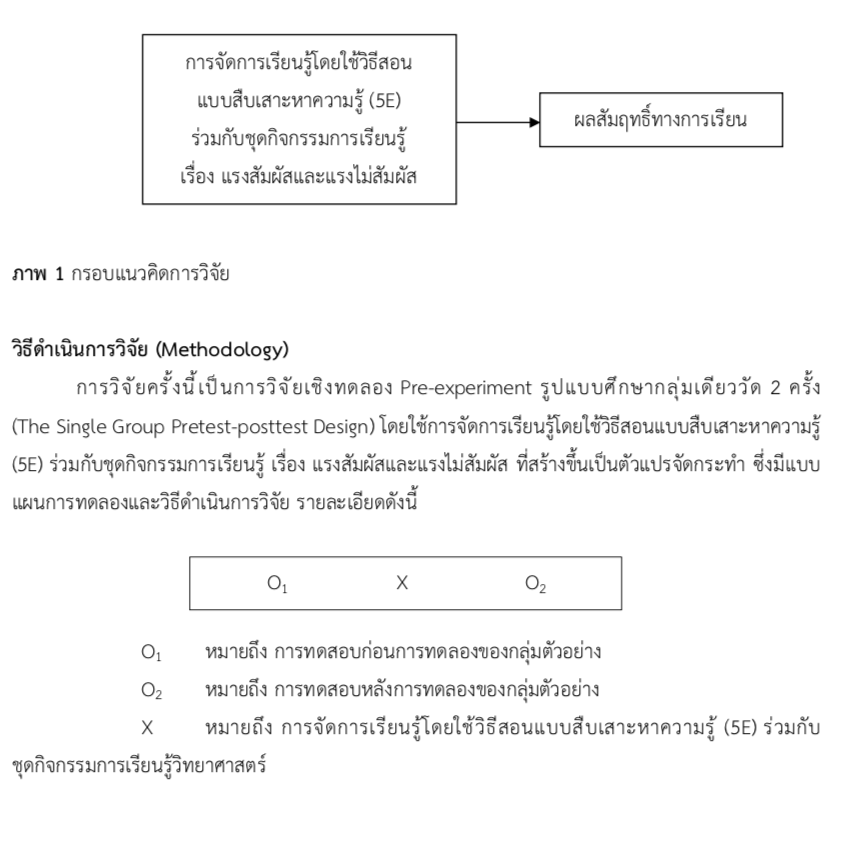การศึกษาผลสัมฤทธิ์ทางการเรียนจากการจัดการเรียนรู้โดยใช้วิธีสอนแบบสืบเสาะหาความรู้ (5E) ร่วมกับชุดกิจกรรมการเรียนรู้ เรื่อง แรงสัมผัสและแรงไม่สัมผัส ของนักเรียนชั้นประถมศึกษาปีที่ 3
Main Article Content
บทคัดย่อ
การศึกษาครั้งนี้เป็นการวิจัยเชิงทดลอง มีวัตถุประสงค์เพื่อเปรียบเทียบผลสัมฤทธิ์ทางการเรียน เรื่อง แรงสัมผัสและแรงไม่สัมผัส ก่อนและหลังการจัดการเรียนรู้ โดยใช้วิธีสอนแบบสืบเสาะหาความรู้ (5E) ร่วมกับชุดกิจกรรมการเรียนรู้ ของนักเรียนชั้นประถมศึกษาปีที่ 3 โรงเรียนสาธิตมหาวิทยาลัยรามคำแหง (ฝ่ายประถม) กรุงเทพมหานคร โดยใช้รูปแบบการวิจัยเชิงทดลองแบบศึกษากลุ่มเดียววัด 2 ครั้ง ทำการศึกษากับตัวอย่างนักเรียน 1 ห้องเรียน จำนวน 30 คน ซึ่งได้มาด้วยวิธีการสุ่มตัวอย่างแบบกลุ่ม (Cluster Random Sampling) เครื่องมือที่ใช้ในการวิจัยประกอบด้วย (1) แผนการจัดการเรียนรู้โดยใช้วิธีสอนแบบสืบเสาะหาความรู้ (5E) ร่วมกับชุดกิจกรรมการเรียนรู้ เรื่อง แรงสัมผัสและแรงไม่สัมผัส จำนวน 1 แผน และ (2) แบบสอบปรนัยชนิดเลือกตอบ สถิติที่ใช้ในการวิจัย ได้แก่ ค่าเฉลี่ย (M) ส่วนเบี่ยงเบนมาตรฐาน (SD) และการทดสอบความแตกต่างของค่าเฉลี่ยระหว่างประชากร 2 กลุ่มที่ไม่เป็นอิสระต่อกัน (Dependent Samples t-test) ผลการวิจัยพบว่า ค่าเฉลี่ยผลสัมฤทธิ์ทางการเรียน เรื่อง แรงสัมผัสและแรงไม่สัมผัสของนักเรียน หลังการจัดการเรียนรู้โดยใช้วิธีสอนแบบสืบเสาะหาความรู้ (5E) ร่วมกับชุดกิจกรรมการเรียนรู้ สูงกว่า ก่อนการจัดการเรียนรู้อย่างมีนัยสำคัญทางสถิติที่ระดับ .05
Downloads
Article Details

อนุญาตภายใต้เงื่อนไข Creative Commons Attribution-NonCommercial-NoDerivatives 4.0 International License.
The authors are solely accountable for the ideas and recommendations articulated in the articles published in The LEAD Journal RU. Should there be any inaccuracies, the authors accept full responsibility for such errors.
Moreover, the Editorial Board, Editorial Team, and Committee of The LEAD Journal RU are committed to maintaining the integrity of the principles reflected in the authors' contributions.
Consequently, Ramkhamhaeng University, the Editorial Board, Editorial Team, and Editors shall not be held liable for any outcomes arising from the authors' presentation of their ideas and recommendations within The LEAD Journal RU.
เอกสารอ้างอิง
Brahmawong, C. (2008). Teaching Documents for Educational Technology, Units 1-5. Bangkok: United Productions. [In Thai].
Buakham, N. (2023). Inquiry-based Learning: Interest-curiosity-investigation a Learning Process that Allows Learners to Find Answers by Themselves. Retrieved December 20, 2024, from https://mappamedia.co/posts/inquiry-based-learning. [In Thai].
Fanchian, N. (2020). The 5 E’s of Inquiry-Based Learning. Retrieved December 21, 2024, from https://www.trueplookpanya.com/education/content/82385. [In Thai].
Institute for the Promotion of Teaching Science and Technology. (2023). Press Conference Announcing the Results of the PISA 2022 Assessment. December 20, 2024, from https://pisathailand.ipst.ac.th/news-21/. [In Thai].
Kanyaprasith, K. (2015). 5 Essential Features of Inquiry. Retrieved December 17, 2024 from http://sciedcenter.swu.ac.th/Portals/25/Documents/News/5 Essential features of inquiry_Kamonwan.pdf?timestamp=1434440007462. [In Thai].
Khanhavet, B. (2002). Educational Innovation. Bangkok: Chulalongkorn University Press. [In Thai].
Kongthan, S. and Kaewurai, W. (2020). The Development of a Science Learning and Activities Package according to Problem-based Learning to Promote Problem Solving Ability for Grade 3 Students. The 12th NPRU National Academic Conference, Nakhon-Pathom Rajabhat University, 196-202. [In Thai].
Ritjaroon, P. (2018). Research Techniques for Improving Learning. Chulalongkorn University Press. [In Thai].
Thanomphan, N. and Phusing, N. (2020). The Study of Learning Achievement on Force and Motion and Skill Scientific Process of Prathomsuksa 3 Students by using Inquiry Learning Model in Conjunction with Skills Exercises. Journal of MCU Ubon Review, 5(3), 193-203. [In Thai].


